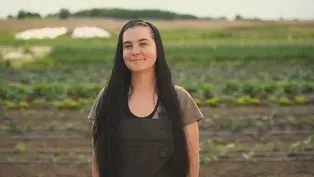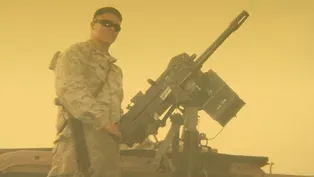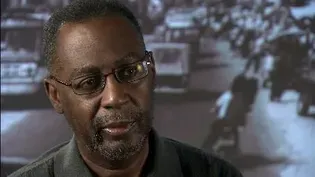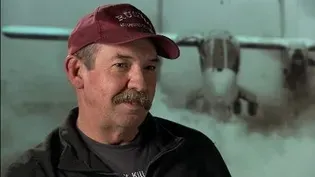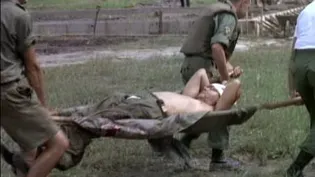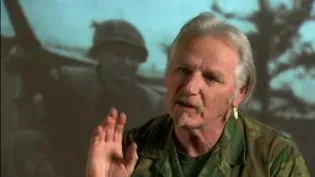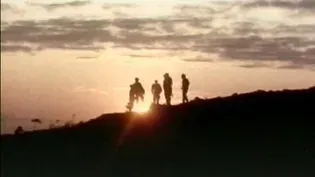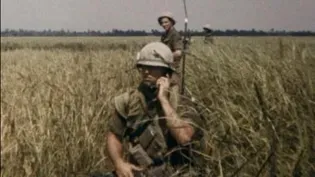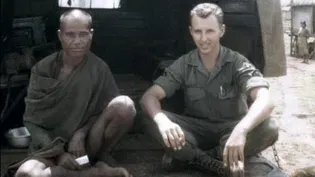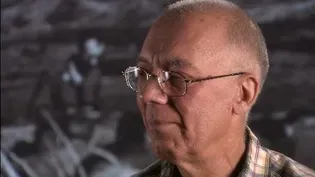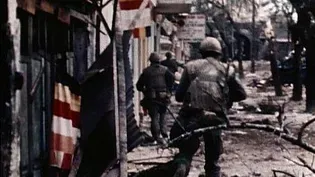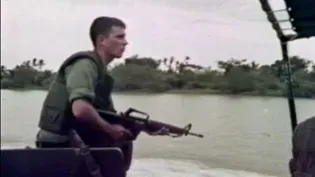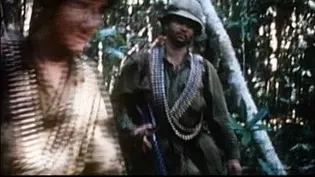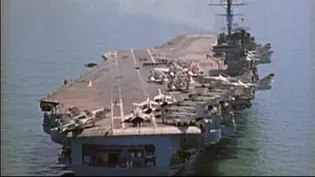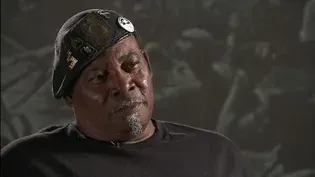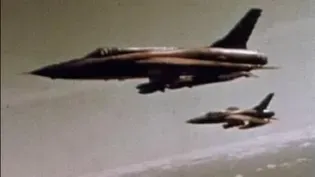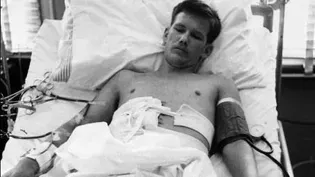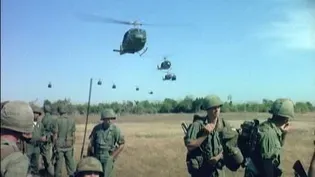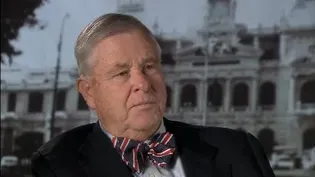
Vietnam: Turning Point - Montagnards
Clip | 6m 57sVideo has Closed Captions
Veterans discuss working with the Montagnards, people indigenous to Vietnam.
Special Forces Army Special Forces developed base camps in the Central Highlands of Vietnam and recruited local indigenous people, Montagnards, to help in the battle against the enemy's hold on the Ho Chi Minh Trail. Veterans discuss their connections with the Montagnards both at camp and as fellow warriors in combat. (Part 2/7)
Problems with Closed Captions? Closed Captioning Feedback
Problems with Closed Captions? Closed Captioning Feedback
Wisconsin War Stories is a local public television program presented by PBS Wisconsin
Thanks to lead gifts from Don and Roxanne Weber, Associated Bank, Ho Chunk Nation and the Lynde and Harry Bradley Foundation.

Vietnam: Turning Point - Montagnards
Clip | 6m 57sVideo has Closed Captions
Special Forces Army Special Forces developed base camps in the Central Highlands of Vietnam and recruited local indigenous people, Montagnards, to help in the battle against the enemy's hold on the Ho Chi Minh Trail. Veterans discuss their connections with the Montagnards both at camp and as fellow warriors in combat. (Part 2/7)
Problems with Closed Captions? Closed Captioning Feedback
How to Watch Wisconsin War Stories
Wisconsin War Stories is available to stream on pbs.org and the free PBS App, available on iPhone, Apple TV, Android TV, Android smartphones, Amazon Fire TV, Amazon Fire Tablet, Roku, Samsung Smart TV, and Vizio.
[gentle guitar music] - Jack Boers: I came back from Korea, Bloody Ridge, Heartbreak Ridge, got out of the military, very bored.
Come by the post office about 10 o'clock in the morning, an old Uncle Sam picture, "We need you."
And I said, "You know, I'm gonna go back."
And I went back, and there were about five or six guys in line.
He said, "Well, you had service, man?"
I said, "Yeah."
He said, "What were you on?"
I said, "I was infantry."
And he says, "Well, you're in the Army as of today."
And then I joined Special Forces and I stayed '59 until '71 in Special Forces.
- Howard Sherpe: We had what I call the interview, and I had put down all kinds of things that I thought I could be in the Army, including combat photographer and combat artist 'cause these are things I had training in.
I had driven trucks.
I put down truck driver.
And he just looked through it and he said, "I'm putting you down for medic."
I just kind of sat there like, "What?"
[laughs] You know, I'd never had a first aid course.
I hated the sight of blood.
He says, "Oh, we need a lot of medics in Vietnam.
Next."
[chuckles] - John Plaster: Because I was Special Forces, what was then referred to generically as a Green Beret, I'd heard whispers about something called SOG.
Whenever I'd ask someone, "Well, what is that SOG thing?"
They'd all hush up or give me stern looks because these were men who had already served.
A friend of mine who'd already deployed to Vietnam and was serving in SOG although I didn't know it, told me, "Sign up for CCN."
Later, we used to refer to that kind of imitation as a flattery of death.
We lost a great many men.
- We set up bases.
We started training the Montagnards or the civilians, and they got paid a little bit, you know, to them, it was quite a bit, but-- and we issued uniforms.
We issued weapons, trained in American tactics and so forth, recon and patrolling, security, an A-team with a bunch of your company Montagnards.
And we'd operate out of there, and it was more or less a kind of eyes and ears for intelligence of the movement of the enemy.
- Working with the Montagnards helped give me a lot of insights on the American Indian because they were basically the American Indians of Southeast Asia, pushed to be a mountain people.
And Montagnards means in French, "mountain people."
I was flown by C-132, a SOG base in the Central Highlands, adjacent to the northernmost provinces of Cambodia and the southernmost provinces of Laos.
And for the first time, it struck me, my God, that's what the big secret is.
We're operating in Laos.
We're running missions along the Ho Chi Minh Trail.
These are very, very dangerous missions where literally, you have two Americans and some Indigenous soldiers, Montagnards, and you're 20, 30, 40 miles behind enemy lines.
If you don't have someone you really wanna rely on and trust virtually with your life, you don't want 'em on your team.
- They said that if anyone wanted to volunteer, we could go into the Montagnard villages and treat the Montagnards.
It was such a different culture.
It was getting in a time machine and taking a trip back almost to the Stone Age.
I just found it enjoyable to go out there and work with them.
I couldn't talk to them, but we treated everything you can imagine.
- In the A camp, a lot of times they had their celebrations.
Then they set up a roll of jojo, rice wine.
And you being the commander of the honor, you gotta sit there and you gotta drink with 'em.
Holy man.
Man, sometimes you like to, when they're gonna have you, you like to hide.
[laughs] But you can't.
But boy, I'll tell you.
- This isn't the only reason that I kept wanting to go back to their villages.
But as soon as you're all done treating everybody, then we can get to the numpai, which is rice wine.
I do have to admit, it gave you a pretty good buzz by the time you headed out of the camp.
- They loved American movies, especially the cowboy movies.
And it was funny because if it was a cowboy and Indian movie, they would identify with the Indians.
- They liked Westerns.
Oh, boy, they hollered and screamed.
They'd tickle you to death.
[laughs] Yeah, they were all right, though.
- I really believe they kinda looked out for us 'cause we'd patrol in some of the same areas.
And one time, there were a bunch of Montagnards that were coming up, and they kinda cowered over to the other side.
And then somebody must have recognized me.
And all at once, they get up and they come running over and shaking hands and bowing.
And so I knew that they knew who I was.
And I think when they know that you're with that patrol, I think maybe you're a little safer.
- The Montagnards worked really well, meshed really well with special forces in these operations because they'd grown up in the jungle.
And we brought the sophistication of modern warfare, communications, air support, and so on.
And working together, it made a very effective team at operating behind enemy lines in a very unforgiving environment.
In fact, of the 22 missions that I ran in SOG, 19 of 'em, we had to shoot our way out.
- They were very good fighters.
I mean, we really relied on 'em.
You had to figure, 10% you were training were Viet Cong, but you don't know who.
You just had to kinda watch, you know.
There were some bad times.
You forget the bad times, remember the good times.
- And we came back to one village one time.
It was deserted.
Nobody was out.
The chief finally came out, and his face looked like somebody had taken a baseball bat to it.
The VC had come in, and in front of all the other villagers, had beat him as an example of what'll happen if you let the Americans treat you.
Even though we were trying to help them, I think they were caught in the middle.
I think a lot of times, they probably didn't have a choice of who they supported if they wanted to stay alive.
- I have a recurring dream where I go back to Vietnam, my team's still there, and they have all my gear.
They're so happy to see me back there.
And it's all the old Yards.
I don't know, maybe it's like an old dog ready to go hunting again or something, but they're ready to go do it again.
Video has Closed Captions
OIF Army veteran Crystal hits the road to find her way home to an organic farm. (5m 20s)
Video has Closed Captions
Vietnam War veterans help today's veterans cope with the invisible scars of combat. (30s)
Vietnam: Draw Down - Rear Echelon
Video has Closed Captions
Veterans assigned to support jobs in the military describe life on and off duty. (7m 40s)
Vietnam: Draw Down - Hamburger Hill
Video has Closed Captions
Veterans recall the haunting memories of a battle they waged for many days. (6m 49s)
Vietnam: Draw Down - Firepower
Video has Closed Captions
Air Force veterans recount dangerous missions targeting the North Vietnamese Army. (8m 1s)
Vietnam: Draw Down - Broken Bodies
Video has Closed Captions
Wounded veterans and hospital staff describe field hospital scenes and returning home. (7m 17s)
Vietnam: Turning Point - Walking Point
Video has Closed Captions
Veterans describe the dangers and responsibilities of walking point. (6m 56s)
Vietnam: Turning Point - The Price
Video has Closed Captions
Veterans reflect on the staggering casualties in Vietnam, and how they coped. (8m 19s)
Vietnam: Turning Point - TET 1968
Video has Closed Captions
The Tet Offensive shocked both soldiers and the American public. (8m 13s)
Vietnam: Turning Point - Montagnards
Video has Closed Captions
Veterans discuss working with the Montagnards, people indigenous to Vietnam. (6m 57s)
Vietnam: Turning Point - Khe Sanh
One of the bloodiest battles of the Vietnam War took place at Khe Sanh. (7m 36s)
Vietnam: Turning Point - Hue City
Video has Closed Captions
The battle at Hue City highlighted the dire state of the Vietnam War. (6m 47s)
Vietnam: Turning Point - Brown Water Navy
Video has Closed Captions
River-based Army and Navy veterans describe facing enemy attacks and Agent Orange. (8m 12s)
Vietnam: Escalation - Send in the Marines
Video has Closed Captions
Marines describe their arrival in Vietnam and the difficulty of jungle warfare. (8m 7s)
Vietnam: Escalation - Naval Presence
Video has Closed Captions
Navy veterans explain their experiences off shore supporting Special Forces. (7m 16s)
Vietnam: Escalation - Elusive Enemy
Video has Closed Captions
Encounters with underground tunnels and their growing uncertainty in the mission. (8m 2s)
Vietnam: Escalation - Dropping Bombs
The allure, challenges and heartbreaking loss of early air combat in Vietnam. (6m 44s)
Vietnam: Escalation - All Hell Broke Loose
As missions became more dangerous, casualties rose. (8m 48s)
Vietnam: Escalation - Airmobile
Veterans of the helicopter brigades describe experiences of bravery, danger and loss. (7m 54s)
Vietnam: Escalation - Advise and Assist
Explore the early events that set the conflict and United States participation in Vietnam. (6m 6s)
Providing Support for PBS.org
Learn Moreabout PBS online sponsorshipSupport for PBS provided by:
Wisconsin War Stories is a local public television program presented by PBS Wisconsin
Thanks to lead gifts from Don and Roxanne Weber, Associated Bank, Ho Chunk Nation and the Lynde and Harry Bradley Foundation.
